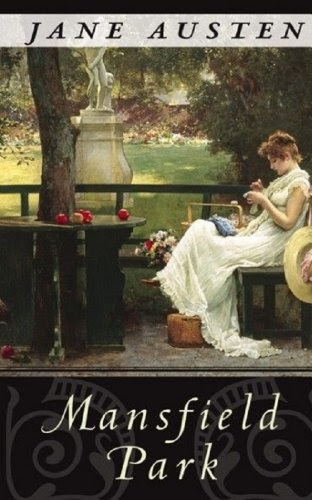Is it Worth the Read? Mansfield Park

Image courtesy of amazon.com
By Caroline Morris
Let’s get one thing straight before this review begins: Jane Austen is a genius. I own all of her novels (some in multiple copies), have a book of her youthful writings, and attest to Pride and Prejudice (2005) being the best movie ever made.
But no author is entirely perfect. There will always be the weakest piece of work. This, for Austen, is Mansfield Park. As a disclaimer, this review focused on the most negative elements of Mansfield Park, because it is a novel that I would only recommend to an already-established Austen fan.
When I first read Mansfield Park, I was on an Austen tear, having read all five of her other completed novels in the weeks preceding, without any desire to stop. To my chagrin, Mansfield Park was not the triumphant end to a book-binge, but a slightly too-long novel whose ending was the one I had been rooting against.
The novel begins, as most Austen novels do, with a depiction of a specific experience of middle-class Regency-era English life. Fanny Price, the novel’s protagonist, is the daughter of Frances Price née Ward, who is the youngest sister of three. Having married a poor sailor and having a fertile streak, she cannot care for all of her children and sends Fanny to live with her aunt, Lady Bertram, who did what was expected of her and married above her station. Thus begins the main conceit of the novel: Fanny living with Bertrams.
This basic premise is solid enough—it feels familiarly Austen—but it is the follow-through that makes the novel drag. Though I doubt many would say that Austen’s novels are particularly action-packed, Mansfield Park is the most insular among characters and location, and little goes on in the plot beyond romantic machinations (most of which the reader does not actually desire or are not funny enough to justify the distasteful nature of a match) and a trip to the home of Fanny’s nuclear family.
I love luxuriating in a novel of yearning and romance as much as the next person, but Mansfield Park does not have that “special something” that makes me obsess about characters sans plot. This may be because, of all of Austen’s protagonists, Fanny is by far the least interesting. Even when there are dances or balls or plays, moments of potential plot interest, Fanny stays firmly planted against the wall due to her unflinchingly rigid moral code.
One of the greatest parts of an Austen novel is the social critique, which is present in this novel, as seen by the book’s opening. However, the female protagonist is typically the one who looks askance at societal expectations and champions the happiness of her own life in spite of them. Fanny, however, is an incredibly passive character and is very dedicated to not disturbing the status quo. Anything that happens happens unto her, not as caused by her; because the novel follows Fanny’s consciousness so closely, this makes the plot move slowly and undercuts the power of any larger commentary.
Additionally, the characters of Mansfield Park are not particularly appealing. Among the Bertrams, there is only one compelling family member named Edmund, Fanny’s cousin, and even he takes an unpleasant amount of time to take any heed of the abandoned Fanny. As he is the only person to ever show Fanny an iota of kindness, she of course falls in love with him and spends the novel yearning after him as he pursues a woman named Mary, who, to put it bluntly, sucks. And I know that during this time period it was not considered weird to marry your cousin, but this blood relation romance that comes to fruition is literally too close for me.
This romance is also one of Austen’s weakest because she does not do well in setting up contrast. A favorite move of Austen’s is to set up another potential love interest for the protagonist that is deeply flawed, but this is often not visible until later, and when it is revealed, it elevates the true love interest in comparison. Henry Crawford, Fanny’s alternate option, is meant to be that, but Austen does not write him to effectively fill this role. He does have flaws, but Austen puts him on a path of self-improvement as a way to deserve Fanny’s love that is deeply compelling and made me root for him rather than Edmund. I was genuinely disappointed when Henry failed, and not just because it meant that cousin-love was inevitable.
Mansfield Park is definitely Austen’s weakest novel, but this does carry an inherent caveat. I still loved reading this novel: it was just the weakest of a strong brood, so it got 4 stars on my Goodreads instead of 5. Due to its character issues and length, this is her least accessible novel for a new reader, but still worth the time to read if you love Austen (or enjoy an opportunity for critical literary analysis).
So if you are looking to read an Austen novel, start with the underrated Persuasion or the illustrious Pride and Prejudice. Maybe Mr. Collins will help build up your tolerance for cousin-love and one day you’ll be able to stomach Mansfield Park.






